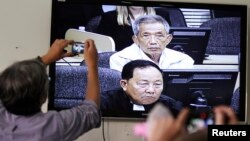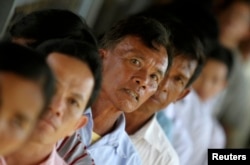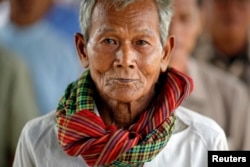The exhibition “I Want Justice!” at the Holocaust Museum examines the history of efforts to hold perpetrators of genocide accountable through court proceedings.
“We want people to know the truth of what happened during the Khmer Rouge’s violent reign and to witness the long-delayed search for justice for the victims now,” said Greg Naranjo, the museum’s special exhibition developer and curator of the Cambodia display when it opened in Washington.
The exhibition features interactive video and audio elements and deals with the United Nations tribunal and other ways Cambodians have tried to heal their trauma.
And, although it focuses on the trials in Cambodia of surviving leaders of the Khmer Rouge regime, it looks at the Nuremburg trials of Nazi leaders in the aftermath of World War II and the International Criminal Court in The Hague, which was established in 2002.
The tribunal
After lengthy negotiations with the international community, Cambodia and the U.N. established the Extraordinary Chambers in the Courts of Cambodia (ECCC).
It is a special Cambodian court that receives international assistance through the United Nations Assistance to the Khmer Rouge Trials (UNAKRT) and is usually referred to as the tribunal.
In 2007, five top Khmer Rouge figures were arrested and charged with war crimes against humanity, but court proceedings have moved very slowly amid disagreements between the Cambodian and international judges and prosecutors that comprise this unique, hybrid court.
The current Hun Sen government, which includes former, midlevel Khmer Rouge leaders who defected, has been accused of interfering in the court in order to limit the number of defendants.
As of 2017, $300 million has been spent and three suspects have been convicted, while two died in custody before being sentenced.
Court proceedings continue.
Cameron Hudson, the director of the museums’ Simon Skjodt Center for the Prevention of Genocide, said the exhibit on justice for Khmer Rouge victims and other genocide survivors is important because the best ways of seeking redress for such events are still being debated.
“There’s no question that international justice is a very expensive proposition. And that the academic research is still rather thin on the degree to which those high-level trials truly help to break the cycle of violence, versus a more grassroots, traditional justice system that tries many more lower-level commanders,” he said.
Michael Abramowitz, who was the director of the U.S. Holocaust Museum’s Levine Institute for Holocaust Education until earlier this year, said the Khmer Rouge tribunal’s achievement was mixed, yet largely positive.
“It seems like a lot of money to spend for a relatively small payoff. On the other hand, it does seem that the people who are most responsible, who are still living, were tried, and I also think that, you know, Cambodians … now have a record in court,” he said.
The fact that the Khmer Rouge suspects were jailed after so many years also offers a warning to all those in power, he added.
“It’s very important to make the point that there is no statute of limitation on crimes against humanity, or on genocide,” Abramovitz said. “The hope would be that people … would think again and say, ‘I am going to end up in court if I pursue this thinking.’”
This report originated on VOA Khmer.













